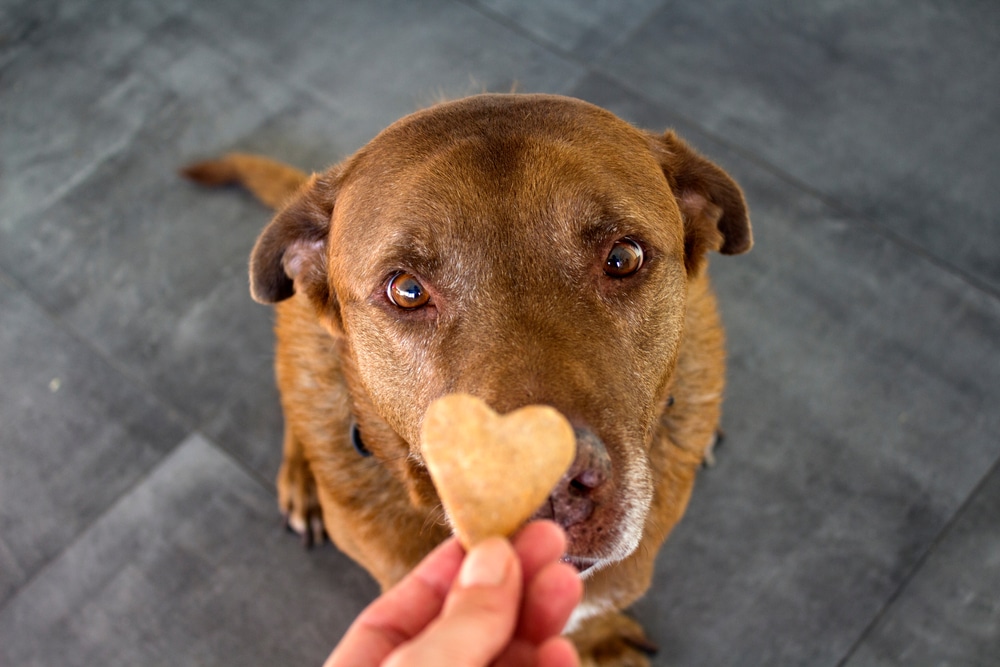When it comes to treating your pup, it’s natural to want to share the love and give them something sweet. But can dogs eat cookies? It’s important for pet owners to understand the risks before feeding their furry friends any type of food so they don’t end up with an upset stomach or worse.
It is generally not a good idea to let dogs eat cookies, especially if they contain toxic ingredients, such as chocolate or xylitol. It is best to stick to dog-specific treats or foods that are safe for dogs. If you would like to give your dog a special treat, many dog-friendly options are designed to be safe for them to eat. Always consult with your vet prior to making any changes to your dog’s diet.
Table of Contents
Are Cookies Safe For Dogs?
Eating cookies can be harmful to dogs for a few reasons. Firstly, many types of cookies contain ingredients that are toxic to dogs, such as chocolate and raisins.
Additionally, cookies often contain large amounts of sugar and fat, which can lead to weight gain and other health problems in dogs if consumed in excess.
Finally, eating too many treats can cause digestive issues in dogs, such as stomach upset and diarrhea. It is generally best to keep cookies and other human foods away from dogs to prevent potential health problems.
The Health Risks Of Giving Your Dog A Cookie

Giving your beloved pup a cookie may seem like an innocent gesture, but it is essential to be aware of potential health risks.
Consuming cookies can adversely affect your dog’s health, so caution should be taken when offering these treats. It is essential to understand the possible risks before indulging your furry friend. Some potential health risks of giving cookies to dogs include the following.
Toxicity
Our beloved furry friends have no idea that certain cookie ingredients can be hazardous to their health. Chocolate, raisins, and macadamia nuts are a few of the toxic substances found in many common snacks, which can cause severe gastrointestinal issues like vomiting or diarrhea, tremors, and even death! It is paramount to keep these treats away from our four-legged family members.
Weight Gain
Cookies are often filled with sugar and fat, which can cause weight gain in dogs if consumed excessively. Weight gain puts your pup at risk for health issues like heart disease, diabetes, and joint pain. Avoid feeding too many treats to keep your dog healthy and happy.
Digestive Issues
Treats like cookies can cause digestive issues in dogs, such as stomach upset and diarrhea, if consumed in large quantities.
Dental Problems
Hard cookies can potentially break a dog’s teeth if they cannot chew them properly.
Some Cookie Ingredients Can Be Toxic To Dogs
Here are some cookie ingredients that can be toxic to dogs.
Chocolate
Chocolate is toxic to dogs due to the chemical, theobromine, present in it. The higher the concentration of this compound, i.e., darker and more bitter chocolate, the more dangerous it becomes for pups. Ingesting large amounts can cause vomiting, diarrhea, rapid breathing, increased heart rate, tremors, and, in the worst cases, seizures, and even death.
Raisins
Raisins can be highly toxic to dogs and may result in kidney failure. Symptoms of raisin intoxication include vomiting, diarrhea, and listlessness.
Macadamia Nuts
Macadamia nuts can cause trembling, weak muscles, and fatigue in our canine friends.
Xylitol
Xylitol is a common sugar-free sweetener found in baked goods and cookies, which can lead to dangerously low blood sugar (hypoglycemia) after a rapid insulin release. Signs of xylitol poisoning are vomiting, coordination loss, and convulsions.
What To Look Out For If Your Dog Has Eaten A Cookie
If your dog has eaten a cookie, it is important to look for potential signs of distress or discomfort. Common symptoms that could indicate your pet has ingested something they shouldn’t include:
- Diarrhea
- Increased body temperature
- Rapid, shallow breathing
- Seizures
- Restlessness
- Increased urination
- Increased heart rate
- Vomiting
If you observe any of these signs, promptly contact your veterinarian. Inducing vomiting may be recommended if the cookie was eaten a short time ago to stop additional digestion of possible damaging ingredients.
Your vet may propose more severe treatments, such as activated charcoal for neutralizing toxins and intravenous fluids in case of dehydration from excessive diarrhea or vomiting.
How To Stop Your Dog From Eating Cookies
Here are some tips for preventing your dog from eating cookies or other potentially harmful foods:
- Keep all cookies and baked goods in airtight containers, away from your pet’s reach.
- Teach your dog the, “Leave it,” command so they know not to touch food on counters or other places.
- Consider putting them in a separate room or crate during mealtimes so they don’t have access to anything you may be eating.
- Give your puppy healthy treats like fruits, vegetables, or carrot sticks instead of cookies as a reward.
- Exercise your pet regularly since tired dogs are less likely to be tempted by snacks and sweets.
- If you notice your dog is getting into things they shouldn’t, try distracting them with a toy or a game instead of offering them treats as a way out of trouble.
- You can also add natural supplements like pumpkin seed powder to their food to help them feel fuller for longer and decrease their cravings for snacking between meals.
- Lastly, if all else fails, consider using compulsive aids such as bitter apple spray on areas where you don’t want them eating anything sweet, like countertops or furniture items.
Alternatives To Cookies
Healthy alternatives to store-bought cookies for dogs are a great option. Fruits, vegetables, and homemade treats made with natural ingredients can be far more economical than buying pre-packaged snacks.
Plus, varying the types of treats you offer your pup helps keep them from getting bored with the same old snack. Not only are these healthier choices, but they also reward good behavior.
Cheese
Cheeses like cheddar and Swiss make excellent snacks for dogs, as long as they are given in small portions.
Carrots
These crunchy veggies can be given raw or cooked and contain healthy nutrients like beta-carotene and fiber to help keep your pup’s digestive system healthy.
Bananas
Loaded with vitamins, minerals, and fiber, they’re great for digestion in your pup. Plus, their naturally sweet taste makes them a tasty treat!
Sweet Potatoes
Full of essential vitamins B6 and C as well as potassium, sweet potatoes are a nutritious snack for your dog. They have a delicious flavor your pup will love!
Applesauce Cups
These single-portion treats can be found in many supermarkets and are a great alternative to cookies for dogs who enjoy the sweet taste of apples.
Broccoli
A wise selection for your pup, this cruciferous vegetable is a healthy source of calcium while containing minimal fat. Packed with essential nutrients, including beta carotene and fiber, it’s an ideal inclusion to your canine companion’s diet!
Green Beans
These crunchy vegetables are full of fiber and contain antioxidants that can help support your pup’s immune system.
Fish Jerky
This type of dog treat is made from real fish, providing your pup with an excellent source of lean protein.
Popcorn
Plain, unsalted popcorn can make a great treat for dogs who enjoy the crunchy texture.
Oatmeal Treats
These treats are usually made with rolled oats, providing your pup with healthy carbohydrates to help fuel their adventures.
In Conclusion: Can Dogs Eat Cookies?
In conclusion, it’s best to avoid letting dogs eat human food like cookies. Although some foods can be given in moderation and with supervision, always consult your vet or pet nutritionist if you’re unsure what is safe for your pup. Our furry friends deserve the best care, so be sure to keep their health and safety as a priority!
So, which alternative to cookies do you plan on giving your dog? Let us know in the comments below!
